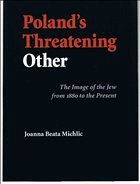In this provocative and insightful book, Joanna Beata Michlic interrogates the myth of the Jew as Poland's foremost internal "threatening other," harmful to Poland, its people, and to all aspects of its national life. This is the first attempt to chart new theoretical directions in the study of Polish-Jewish relations in the wake of the controversy over Jan Gross's book Neighbors. Michlic analyzes the nature and impact of anti-Jewish prejudices on modern Polish society and culture, tracing the history of the concept of the Jew as the threatening other and its role in the formation and development of modern Polish national identity based on the matrix of exclusivist ethnic nationalism.
In the late nineteenth century and throughout the greater part of the twentieth, exclusivist ethnic nationalism predominated over inclusive civic nationalism in Polish political culture and society. Only in the aftermath of the political transformation of 1989 has Polish civic nationalism gradually gained predominance. As civic nationalism has become more assertive, Polish scholars have begun to unearth and critically examine the legacies of Polish anti-Semitism and other anti-minority prejudices. Michlic conducted extensive research in Polish, British, and Israeli archives for this book. Poland's Threatening Other contributes to modern Jewish and Polish history, the study of nationalism, and to a new school of critical inquiry into the nature of anti-Jewish prejudices.
Joanna Beata Michlic is an assistant professor in the Holocaust and Genocide Studies program at the Richard Stockton College of New Jersey. She was a visiting scholar in the Department of Near Eastern and Judaic Studies at Brandeis University in 2003-05 and is the co-editor of The Neighbors Respond: The Controversy over the Jedwabne Massacre in Poland and Coming to Terms with the "Dark Past": The Polish Debate about the Jedwabne Massacre.
Chapter 1 - The Concept of the Jew as the Threatening Other and Modern Nation Building in Poland: General Introduction; Chapter 2 - The Representation of the Jew as the Threatening Other: Historical Introduction Part I.; Chapter 3 - The Myth of the Jew as the Threatening Other and its Functions in Interwar Poland, 1918-1939: Historical Introduction Part II.; Chapter 4 - The Myth and Anti-Jewish Violence between 1918 and 1939: The Uses of the Myth in Instigation, Rationalization and Justification of Violence.; Chapter 5 - Perceptions of Jews during the German Occupation of Poland, 1939-1945: The Development and Persistence of the Myth under a New Set of Political and Social Circumstances.; Chapter 6 - Old Wine in a New Bottle: Ethno-Nationalist Influence on Polish Perceptions of Jews in the Early Post-War Period, 1945-49.; Chapter 7 - "Judeo-communists, Judeo-Stalinists, Judeo-anti-Communists and National Nihilists": The Communist Regime and the Myth, 1950s -1980s.; Chapter 8 - Conclusions: The Beginning of the End of the Image of the Jew as Threatening Other in Post-Communist Poland.
In the late nineteenth century and throughout the greater part of the twentieth, exclusivist ethnic nationalism predominated over inclusive civic nationalism in Polish political culture and society. Only in the aftermath of the political transformation of 1989 has Polish civic nationalism gradually gained predominance. As civic nationalism has become more assertive, Polish scholars have begun to unearth and critically examine the legacies of Polish anti-Semitism and other anti-minority prejudices. Michlic conducted extensive research in Polish, British, and Israeli archives for this book. Poland's Threatening Other contributes to modern Jewish and Polish history, the study of nationalism, and to a new school of critical inquiry into the nature of anti-Jewish prejudices.
Joanna Beata Michlic is an assistant professor in the Holocaust and Genocide Studies program at the Richard Stockton College of New Jersey. She was a visiting scholar in the Department of Near Eastern and Judaic Studies at Brandeis University in 2003-05 and is the co-editor of The Neighbors Respond: The Controversy over the Jedwabne Massacre in Poland and Coming to Terms with the "Dark Past": The Polish Debate about the Jedwabne Massacre.
Chapter 1 - The Concept of the Jew as the Threatening Other and Modern Nation Building in Poland: General Introduction; Chapter 2 - The Representation of the Jew as the Threatening Other: Historical Introduction Part I.; Chapter 3 - The Myth of the Jew as the Threatening Other and its Functions in Interwar Poland, 1918-1939: Historical Introduction Part II.; Chapter 4 - The Myth and Anti-Jewish Violence between 1918 and 1939: The Uses of the Myth in Instigation, Rationalization and Justification of Violence.; Chapter 5 - Perceptions of Jews during the German Occupation of Poland, 1939-1945: The Development and Persistence of the Myth under a New Set of Political and Social Circumstances.; Chapter 6 - Old Wine in a New Bottle: Ethno-Nationalist Influence on Polish Perceptions of Jews in the Early Post-War Period, 1945-49.; Chapter 7 - "Judeo-communists, Judeo-Stalinists, Judeo-anti-Communists and National Nihilists": The Communist Regime and the Myth, 1950s -1980s.; Chapter 8 - Conclusions: The Beginning of the End of the Image of the Jew as Threatening Other in Post-Communist Poland.

